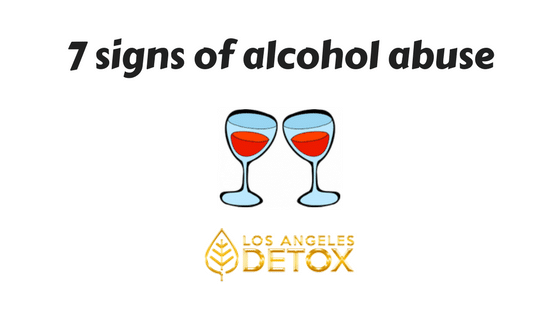Alcoholism is a serious disease that millions of Americans battle each day. It may be difficult at first to discern between normal, casual drinking and problem drinking. If you’re asking yourself if you or someone you know has a drinking problem, read through the symptoms below.
In addition, consider getting professional help from your physician, an information hotline, or an addiction specialist. Alcohol abuse can have severe negative consequences for the drinker and his or her loved ones, so the sooner help is sought, the better.
7 Signs of Alcohol Abuse
-
Blacking out and Memory Loss
Blackouts and not remembering events that happened during the time of intoxication may be indicative of alcohol abuse. Memory loss occurs from high blood-alcohol (BAC) levels which severely alter brain functioning, both in the short and long term. This type of drinking is dangerous and should be a concern for loved ones.
If you drink to the point of memory loss and feel compelled to drink heavily it is strongly suggested you seek treatment. Alcohol isn’t worth the brain damage and other long-term consequences it induces.
2. Self-Medicating: Drinking When You’re Down
If you turn to your favorite drink as soon as you’re feeling anxious, overwhelmed, or depressed, you may have an unhealthy relationship with alcohol. While it is normal to enjoy the stress-relieving effects of having something to drink, using alcohol as a means to make you feel better is a warning sign of abuse.
Keep in mind that any boost in mood from alcohol is very temporary. Drinking actually increases your risk of both depression and anxiety, so drinking is not the best method for alleviating these. Anxiety often appears as soon as the drinking episode has ended, as drinking heavily changes levels of serotonin in the brain, so it is not the best route for short-term relief either.
3. You’ve Attempted to Quit Drinking or Cut down but Can’t
Most of us face some level of resistance when quitting or cutting back on an unhealthy habit. Attempting this with alcohol can be especially difficult. If you’ve tried to either reduce your drinking or quit altogether and are still struggling, you may want to consider seeking help from a rehab facility or some other professional. Once the habit is established it can be extremely difficult to get rid of without guidance and care for not only the psychological dependence, but the physical as well.
4. Feeling Like You Need to Drink to Have Fun or Be Social
Do you feel the need to drink when meeting new people, attending networking events, or socializing at your child’s birthday party? If this sounds like you, it may be an indication of a drinking problem.
You shouldn’t feel compelled to drink to feel comfortable in these types of situations, and it is likely only covering up deeper issues you might have, such as social anxiety or perhaps other specific fears lying in your subconscious. Counseling and professional care can go a long way in helping you identify those issues and find solutions as alternatives to drinking.
5. Red Flushed Skin/Broken Capillaries on the Face
One of the telltale signs of alcoholism is a red, flushed face and broken capillaries, especially on the nose. Alcohol dilates and damages blood vessels, which can cause symptoms ranging from rosy cheeks to visible blood vessels across the face. Alcoholism also damages and thins the skin which makes the blood vessels more visible.
If you’ve noticed reddening of your face you may want to consider the impact alcohol is having on your body. Once drinking starts producing lasting effects, it is a sign that the habit is approaching a problematic level. If you struggle to manage your drinking, seek help immediately.
6. Shaking and Trembling Hands
Shaking, especially in the hands is a common symptom of alcohol dependence that occurs within hours of the last drinking episode. It is caused by the change in stimulation of nerve cells when one is drinking versus sober. This leads to overactivity when withdrawing because the body is used to the suppressing effects of alcohol.
You may also experience shaking and trembling if you are a heavy drinker and then quit cold-turkey. This can be a symptom of the condition delirium tremens, which can be fatal. This is the reason it is so important to seek out a rehab for detox and treatment if you are a heavy drinker.
7. Family Problems Caused by Drinking
If your drinking habits cause recurring arguments with friends, family, or a spouse, it may be time to think seriously about getting help. Professionals in the field find conflict in close personal relationships to be a clear warning sign of addiction. The sooner you start on the path to recovery, the sooner you’ll mend relationships and heal your body.
Some other signs of alcoholism:
-Hiding or lying about your alcohol use
-Withdrawal symptoms when you stop drinking
-Morning or midday drinking







